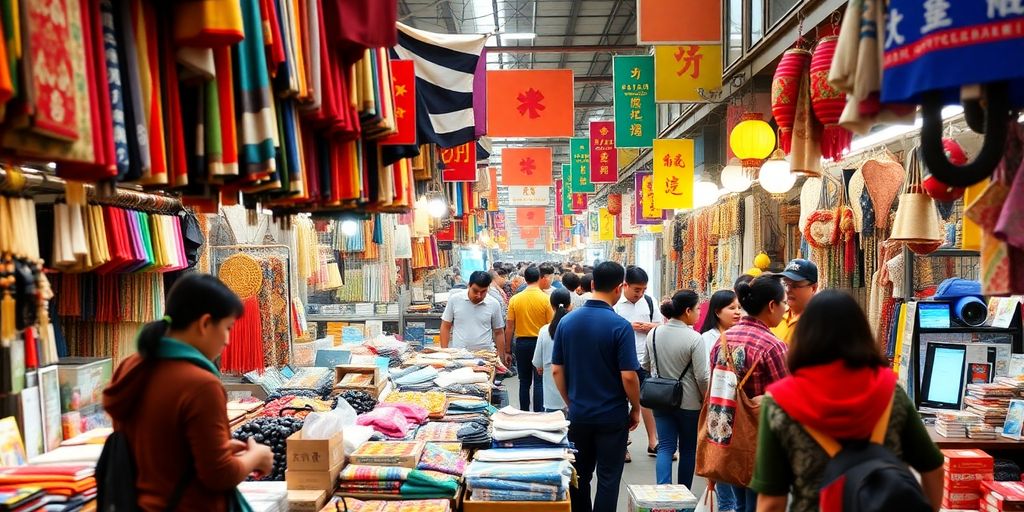Ever thought about diving into global trade? If you’re looking to boost your business profits, wholesale dealers in China might be your golden ticket. China’s wholesale market has grown massively, offering a wide range of products at competitive prices. Whether you’re a small business or a large retailer, understanding how to work with Chinese wholesale dealers can open up a world of opportunities. Let’s get into why choosing wholesale dealers in China could be a game-changer for your business.
Key Takeaways
- China’s wholesale market is a major player in global trade, offering a vast range of products.
- Working with Chinese wholesale dealers can significantly reduce sourcing costs for businesses.
- Platforms like Alibaba and 1688 provide access to numerous suppliers, making product sourcing easier.
- Quality standards in China have improved, with many suppliers meeting international expectations.
- Building strong relationships with Chinese suppliers can lead to better terms and long-term partnerships.
Understanding the Role of Wholesale Dealers in China
The Evolution of China's Wholesale Market
China’s wholesale market has undergone a massive transformation over the years. Initially, it was all about traditional markets and small-scale dealers. But now, it’s a bustling hub of trade with advanced logistics and digital platforms. This shift has opened up new opportunities for businesses worldwide. Wholesale dealers in China have become key players in global supply chains. They offer a vast array of products, from electronics to textiles, catering to diverse business needs.
Key Players in the Chinese Wholesale Industry
The Chinese wholesale industry is dominated by a few major players. Companies like Alibaba and 1688 have set the standard for online wholesale transactions. They provide platforms that connect millions of suppliers with buyers globally. These platforms not only offer competitive pricing but also ensure a wide selection of products. Additionally, traditional markets in cities like Guangzhou are still thriving, offering unique sourcing opportunities. This article highlights the top wholesale markets in Guangzhou, known for efficient product sourcing.
How Wholesale Dealers Drive Economic Growth
Wholesale dealers are a backbone of China’s economy. They not only facilitate trade but also drive economic growth by providing jobs and boosting manufacturing. By linking manufacturers with international buyers, they help in expanding China’s export capabilities. This, in turn, contributes significantly to the country’s GDP. Moreover, the success of wholesale trade has encouraged innovation and quality improvement, making Chinese products more competitive on the global stage.
The role of wholesale dealers in China extends beyond mere transactions; they are pivotal in shaping the country’s economic landscape, influencing everything from local employment to international trade dynamics.
Why Choose Chinese Wholesale Dealers for Your Business
Cost-Effective Sourcing Solutions
When it comes to reducing costs, Chinese wholesale dealers are hard to beat. Their pricing is often significantly lower than what you’d find elsewhere, making them a popular choice for businesses looking to maximize their profit margins. Many platforms like Alibaba offer a vast selection of products at prices that can drastically cut your expenses. Ordering in bulk from these dealers can further reduce costs, allowing you to pass savings onto your customers or increase your margins.
Diverse Product Range and Availability
Chinese wholesalers provide an extensive array of products, from electronics to textiles, ensuring you can find just about anything you need. This diversity not only broadens your product offerings but also helps you keep up with market trends. With platforms like Alibaba and Made-in-China, you have access to millions of products, meaning you can easily adapt to changing consumer demands without having to switch suppliers frequently.
Quality Assurance and Standards
The quality of products from Chinese suppliers has improved significantly over the years. Many suppliers now adhere to international quality standards, ensuring that the items you receive are reliable and safe. This improvement in quality is crucial for maintaining customer trust and satisfaction. Plus, many platforms offer buyer protection policies, which help safeguard your purchases and ensure you receive what you ordered.
Top Chinese Wholesale Platforms to Consider

When you’re diving into the world of Chinese wholesale, picking the right platform is like choosing the right tool for a job. It can make or break your business. Let’s break down some of the key platforms you might want to consider.
Alibaba: The Giant of Wholesale Trade
Alibaba is the heavyweight champion of wholesale trade. It’s a massive platform with a dizzying array of products. Whether you’re looking to resell or create your own brand, Alibaba has got you covered. With thousands of suppliers, the competition keeps prices low, but watch out for delivery times—they can be a bit unpredictable. It’s a good idea to plan your orders carefully.
Global Sources: Connecting Buyers and Suppliers
Global Sources is a bit different. It’s known for its trade shows, which give buyers a chance to meet suppliers face-to-face. This platform is all about trust, thanks to its verified supplier profiles. It’s not the easiest to navigate, especially if you’re new, but once you get the hang of it, it can be a goldmine.
1688: A Local Favorite with Global Reach
1688 is part of the Alibaba family, but it’s more focused on the Chinese market. This means you’ll find some of the best prices around. However, the site is in Chinese, so you’ll probably need Google Translate to help you out. If you’re willing to put in the effort, the savings can be significant.
Choosing the right platform isn’t just about finding the lowest price. It’s about building a reliable supply chain and ensuring quality. Sometimes, it’s worth paying a little more for peace of mind.
When exploring these platforms, don’t just stick to one. Diversifying your suppliers can help you avoid stockouts and keep your business running smoothly. If you’re curious about more options, check out reliable wholesale websites in China for a broader view.
Navigating the Challenges of Sourcing from China
Sourcing products from China can be a goldmine for businesses looking to cut costs and expand their product range. But let’s be real, it comes with its fair share of challenges. Here’s a breakdown of what you might face and how to handle it.
Overcoming Language Barriers
Communicating with suppliers in China can be tricky, especially if language barriers get in the way. Misunderstandings can lead to incorrect orders or delays. To tackle this, consider hiring a translator or using translation tools. Also, it’s a good idea to learn some basic Mandarin phrases. Suppliers appreciate the effort and it can make negotiations smoother.
Ensuring Product Quality and Authenticity
Quality issues are a common concern when sourcing from abroad. To avoid this, always request samples before placing a large order. Here are some steps to ensure quality:
- Use a reliable third-party inspection service to check the goods.
- Clearly outline your quality standards in the contract.
- Regularly communicate with your supplier to address any concerns early.
Managing Shipping and Logistics
Shipping from China can be a headache, with potential delays and unexpected fees. Here’s how to manage it:
- Plan for longer shipping times and factor this into your inventory management.
- Be aware of unexpected fees and withheld goods that might pop up.
- Use a logistics partner familiar with Chinese exports to navigate these waters more smoothly.
Sourcing from China isn’t without its hurdles, but with the right approach and preparation, you can turn these challenges into opportunities for growth. Stay informed, plan ahead, and always keep communication lines open with your suppliers.
Maximizing Profits with Chinese Wholesale Products

Strategies for Competitive Pricing
When it comes to pricing, getting it right is key. You want your prices to be attractive but also profitable. Chinese wholesale markets offer a wide range of products at competitive prices, allowing you to set your prices strategically.
- Research the market to understand the going rates for similar products.
- Consider your shipping and handling costs when setting prices.
- Keep an eye on currency exchange rates; they can impact your costs and pricing.
Leveraging Bulk Purchase Discounts
Buying in bulk is a game-changer. By purchasing larger quantities, you can significantly reduce the cost per unit.
- Negotiate with suppliers for better rates on bulk orders.
- Plan your inventory needs carefully to avoid overstocking.
- Monitor sales trends to adjust your bulk purchasing strategy.
Enhancing Product Offerings
Diversifying your product line can attract more customers and boost sales. With the vast array of products available from Chinese wholesalers, you can easily expand your offerings.
"Expanding your product range not only meets diverse customer needs but also opens up new revenue streams."
- Explore new product categories that complement your existing line.
- Test new products in small quantities before committing to large orders.
- Stay updated on market demand and competition to ensure your products remain relevant.
Building Strong Relationships with Chinese Suppliers
Effective Communication Strategies
Building a solid partnership with Chinese suppliers starts with communication. Understanding cultural nuances is key. While English is often used in business, having someone fluent in Mandarin can help bridge gaps. This isn’t just about language; it’s about Guanxi, a concept that emphasizes the importance of relationships and networks in Chinese business culture. Regular check-ins and face-to-face meetings, when possible, can reinforce these bonds.
Negotiating Favorable Terms
Negotiation is a delicate art, especially when dealing with suppliers from different cultural backgrounds. It’s crucial to approach negotiations with a win-win mindset. Instead of just focusing on price, consider terms like delivery schedules, payment terms, and quality assurances. Being flexible and open to compromise can lead to more favorable terms and long-term benefits.
Maintaining Long-Term Partnerships
Once you’ve established a relationship, maintaining it is vital. This means being consistent in your dealings and honoring commitments. Regular feedback and open communication can help resolve issues before they escalate. Also, recognizing and appreciating your supplier’s efforts can go a long way in cementing a strong partnership. Think of it as a two-way street where both parties work towards mutual success.
Relationships with Chinese suppliers are not just about transactions; they’re about building trust and understanding over time. A strong partnership can lead to better terms, improved product quality, and ultimately, a more successful business.
Legal and Regulatory Considerations in Chinese Wholesale Trade
Understanding Import and Export Regulations
When you’re dealing with wholesale trade in China, it’s like navigating a maze of rules. Chinese regulations can be complex. First, there’s the Anti-Monopoly Law (AML), which is a big deal. If you’re planning any mergers or acquisitions, you need to be aware of this merger control legislation. Then, you have to think about customs. Every product you bring in or send out has to clear customs, and each type of product might have its own set of rules. So, if you’re shipping electronics, make sure they have the China Compulsory Certificate (CCC) to avoid any hiccups.
Compliance with International Trade Laws
Now, it’s not just about Chinese laws. International trade laws come into play too. You need to make sure your business practices align with global standards. This means looking at things like tariffs, trade agreements, and any restrictions that might apply to your products. It’s a good idea to have a legal expert who knows both Chinese and international trade laws to help you out.
Protecting Intellectual Property Rights
Intellectual property rights are crucial when trading with China. You want to make sure your designs, patents, and trademarks are protected. Register your intellectual property in China to prevent any unauthorized use or copying. This is especially important if you are manufacturing unique products. Without proper protection, you might find your products being copied and sold without your consent. Always keep an eye on your IP rights and take action if you notice any infringement.
The legal landscape in China can be tough, but with the right knowledge and preparation, it’s manageable. Make sure to stay informed and consult with professionals who understand the intricacies of Chinese trade laws. This way, you can focus on growing your business without legal worries.
The Future of Wholesale Trade in China
Emerging Trends in the Wholesale Market
The wholesale market in China is buzzing with new trends that are shaping its future. Digital transformation is at the forefront, with more businesses embracing e-commerce platforms to reach a wider audience. This shift is not just about selling online; it’s about using data analytics to understand consumer demands better and adjust supply chains accordingly. There’s also a growing emphasis on sustainability, as consumers and businesses alike push for environmentally friendly practices. As the market evolves, expect to see more innovative approaches to sourcing and distribution that cater to these demands.
Technological Innovations in Sourcing
Technology is revolutionizing how products are sourced in China. Automated processes, AI, and machine learning are being used to streamline operations, making them faster and more efficient. For instance, AI can predict trends and optimize inventory levels, reducing waste and improving profitability. Blockchain technology is also gaining traction, offering transparency and traceability in the supply chain, which is crucial for maintaining quality standards and building trust with international partners.
Sustainability and Ethical Sourcing
Sustainability isn’t just a buzzword in China’s wholesale trade; it’s becoming a necessity. With global pressure to reduce carbon footprints, Chinese suppliers are increasingly adopting green practices. This includes everything from using renewable energy sources in manufacturing to ensuring fair labor practices. Ethical sourcing is also on the rise, as companies look to ensure that their products are made responsibly. This shift not only helps the environment but also enhances the reputation of "Made in China" products on the global stage.
As China continues to expand its global trade presence, these trends will play a significant role in shaping the future of wholesale trade. Embracing technology and sustainability will not only boost efficiency but also ensure that China remains a key player in the global market.
In conclusion, the future of wholesale trade in China is bright and full of possibilities. By adapting to these emerging trends, businesses can not only thrive but also contribute positively to the global economy. With China’s exports increasing, the opportunities for growth and innovation are endless.
Case Studies: Success Stories of Businesses Using Chinese Wholesale Dealers
Small Business Success with Alibaba
Many small businesses have found their footing by tapping into the resources offered by Alibaba. This platform has been a game-changer, connecting them with a vast array of suppliers. For instance, a small home decor shop in the Midwest was able to double its inventory without doubling costs. By negotiating directly with manufacturers, they secured a 15% discount on bulk orders. This allowed them to offer competitive prices while maintaining healthy profit margins.
Retail Giants Partnering with Chinese Suppliers
Retail giants aren’t left out of the equation. Big names in the retail sector have also partnered with Chinese suppliers to keep their shelves stocked with diverse products. A major electronics retailer, for example, credits its successful expansion to strategic alliances with Chinese manufacturers. By sourcing directly, they cut out middlemen, reducing costs significantly. This partnership model not only ensures a steady supply of goods but also fosters innovation by encouraging suppliers to develop new products tailored to market demands.
Innovative Products from Chinese Manufacturers
Innovation is at the heart of many success stories involving Chinese wholesale dealers. A startup focusing on eco-friendly products collaborated with a Chinese manufacturer to develop a line of biodegradable utensils. This partnership was instrumental in bringing their vision to life, allowing them to launch a unique product that quickly gained traction in the market. The manufacturer’s ability to adapt and meet specific design requirements played a crucial role in the startup’s rapid growth.
Working with Chinese wholesale dealers can be a transformative experience for businesses of all sizes. Whether you’re a small retailer or a large corporation, the potential for innovation and growth is immense. The key lies in building strong relationships and leveraging the extensive resources available through these partnerships.
In the world of business, many companies have found great success by partnering with Chinese wholesale dealers. These businesses have shared their stories of growth and achievement, showcasing how they accessed affordable products and expanded their market reach. If you’re curious about how these success stories can inspire your own business journey, visit our website for more insights and resources!
Conclusion
So, there you have it. Diving into the world of wholesale in China can be a game-changer for your business. With the right approach, you can tap into a vast array of products at competitive prices, all while ensuring quality and reliability. It’s not just about finding the cheapest option, but about building relationships with trustworthy suppliers who can support your business growth. Remember, the key is to do your homework, understand the market, and choose platforms that align with your needs. Whether you’re a seasoned pro or just starting out, the opportunities are endless. So, why wait? Start exploring and watch your profits soar!
Frequently Asked Questions
What makes Chinese wholesale dealers a good choice for businesses?
Chinese wholesale dealers offer low prices, a wide variety of products, and improved quality standards, making them a popular choice for businesses looking to save money and access diverse products.
Is it safe to buy wholesale products from China?
Yes, it is safe to buy from China, especially if you choose verified suppliers and use platforms with buyer protection policies to ensure secure transactions.
How can I avoid scams when buying from Chinese suppliers?
To avoid scams, always check supplier reviews, verify their credentials, and use platforms that offer buyer protection policies.
What are some popular Chinese wholesale websites?
Some popular websites include Alibaba, 1688, and Global Sources, each offering a wide range of products and suppliers.
How do Chinese wholesale dealers ensure product quality?
Many Chinese suppliers follow strict quality standards and offer product samples to ensure that buyers receive high-quality goods.
What should I consider when choosing a Chinese wholesale platform?
Consider factors like product variety, pricing, supplier verification, and buyer protection policies when choosing a platform.
How can I communicate effectively with Chinese suppliers?
Use clear and simple language, consider using translation tools, and establish regular communication to ensure smooth transactions.
What are the benefits of buying in bulk from Chinese wholesale dealers?
Buying in bulk often leads to lower prices per unit, allowing businesses to maximize profits and offer competitive pricing to their customers.





